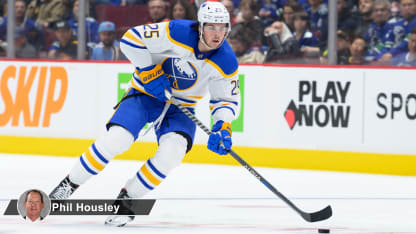The NHL is a tough league for defensemen, and they always say you don't really reach your pinnacle until you're 25. It takes that long to get adjusted to the speed, to the process of reading situations defensively and, more importantly, just knowing the personnel that you're playing against.
That takes time and some experience just knowing the ins and outs of what players are thinking and what they do in certain situations. There's a lot to process as a defenseman and then on top of it, having to add to the attack, add to the rush, which is prevalent in the game today.
You hear coaches talking about getting that fourth guy, maybe that fifth guy, in the attack on the transition.
The first thing I did when coaching a young defenseman was tell him, "Don't do what I did, do what I say," because I was on the attack all the time. But I think as a defenseman you're there to defend.
If you protect your end, you're sound defensively, you're not a defensive liability, all the other things and avenues will open up offensively. You don't have to force the game. You allow the game to come to you. You'll know when to jump and when you've got to go and when maybe you can take a risk.
You've got to allow these guys to play the game and allow them to make mistakes. You just want to limit the ones that result in giving up odd-numbered situations.
But I really was excited to let these guys go. You've got to loosen the reins. You've got to let these guys play. These guys are terrific players, especially in the game today, so my advice was "Just be sound defensively."
It's very rare when a player can come in and have a major impact right away. I'm not saying he can't, but as far as the defensive position, you know the players have skill, they have great hockey IQ, and they can make plays.
Sabres 19-year-old rookie Owen Power is learning this now. I saw Power a little bit at the end of last season, and I was impressed with his range and his command that he had on the ice. He's a terrific skater for being such a big guy (6-foot-6, 218 pounds).
He reminds me of a Rod Langway-type. He's really good on both sides of the puck. He's big, he's rangy, he can be physical, he can box out really well. He has all those attributes to become a big star in this league.
What Moritz Seider did with the Detroit Red Wings last season, getting 50 points (seven goals, 43 assists) in 82 games and winning the Calder Trophy as the top NHL rookie as a 20-year-old, was impressive. I think with the rebuild in Detroit, he was allowed to play his game.


















